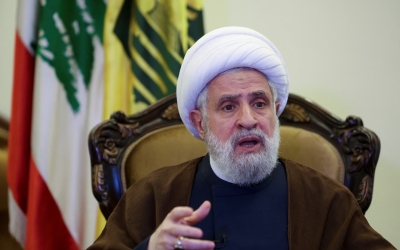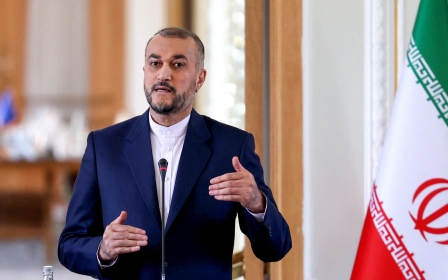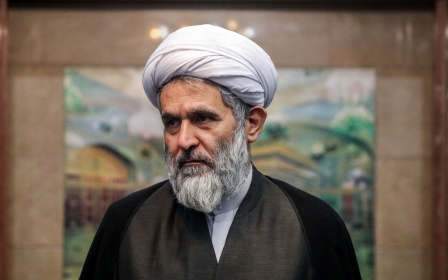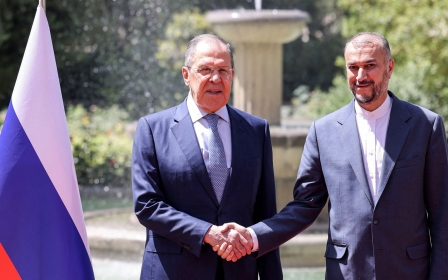Iran heads to Qatar nuclear talks with softened positions and refreshed team
Renewed optimism has followed news that Iran and the United States will conduct indirect nuclear deal talks in Qatar, with a shakeup of the Iranian negotiation team and shifting expectations believed to have opened space for a breakthrough.
Talks in Doha are expected to be held on Tuesday and Wednesday, in the hope that an agreement can be reached to curb Iran's nuclear ambitions in return for sanctions relief.
The 2015 JCPOA nuclear deal struck under the Obama administration was unilaterally torn up by Donald Trump in 2018, and though there has been a willingness on both sides since Joe Biden's election to return to the accord, negotiations have faltered in recent months.
'Bagheri's approach has been softened to some extent'
- Iranian source
Yet on Monday it was reported that Ali Bagheri Kani and Robert Malley, Tehran and Washington's chief negotiators, are en route to Qatar for a fresh round of talks.
An Iranian source familiar with the talks told MEE that the developments were a cause for optimism, with indications that Iran is ready to show flexibility and seal the deal.
New MEE newsletter: Jerusalem Dispatch
Sign up to get the latest insights and analysis on Israel-Palestine, alongside Turkey Unpacked and other MEE newsletters
Among the most thorny issues has been Washington's inclusion of the Islamic Revolutionary Guard Corps (IRGC) on the Foreign Terrorist Organisation (FTO) list. Iran has sought to remove it, but found resistance from the Biden administration, particularly after Israeli intervention.
A source previously told MEE that Iran had dropped its Revolutionary Guard demand, but has called for the lifting of sanctions imposed by the US against Khatam-al Anbiya Construction Headquarters, an economic arm of the IRGC, and a few other related entities.
Softened approach
Bagheri Kani was the right-hand man of former nuclear chief negotiator Saeed Jalili between 2007 and 2013.
Both men were known for their inflexibility and hardline approach to foreign policy, and faced criticism over the original nuclear talks - and the most recent - for failing to secure proper sanctions relief.
However, a source told MEE that, while Bagheri Kani first populated his team with hardline allies, he has lately sidelined or removed them, including Hamid Reza Asgari, an influential figure who had a strong influence on both Jalili and Bagheri.
"Bagheri's approach has been softened to some extent," the source said, adding that the negotiator and Iran's foreign minister, Hossein Amirabdollahian, were ready to finalise the deal in early March.
"However, there were some voices against the draft outside the foreign ministry, which led to Iran's change of plan," the source said.
"Amirabdollahian had even managed to get a green light for dropping the issue of the IRGC's FTO listing, but his interview with state TV in late March, declaring it live on TV, created obstacles in his way by pressure groups."
A conservative source told MEE that hardliners want Amirabdollahian out of the foreign ministry due to a foreign policy approach that isn't "revolutionary" enough.
The source said the hardliners were also upset with Bagheri Kani over his moderate position - but prefer him to Amirabdollahian.
Dissenting views
Media associated with Iran's hardliners has reacted angrily to the resumption of talks.
The Kayhan newspaper described last week's visit of EU foreign policy chief Josep Borrell to Tehran, which came ahead of the decision to begin negotiations in Doha, as a plan by the US and Europe to walk Iran into a trap.
The influential daily suggested the US and Europe wanted to convince Iran to welcome the "continuation of the talks" and "retreat from Iran's main conditions".
'Iran and the US aren’t able to retreat and show flexibility to a large extent. They are under pressure in domestic politics'
- Iran-based analyst
It added that Iran had overcome the challenge of sanctions and was coming out of recession, so there was, it said, no need to negotiate with "the evil and criminal West".
Some observers believe that the new round of talks should be approached with caution.
An Iran-based foreign policy analyst, speaking on condition of anonymity, told MEE they were not optimistic.
"Iran and the US aren't able to retreat and show flexibility to a large extent. They are under pressure in domestic politics and that's the issue that ties their hands," the analyst said.
"The Borrell agreement with Tehran was over restarting the talks, not the disagreements. However, Tehran and the White House both seem to have the political will as they both need a deal, but that doesn't necessarily mean that we should consider the deal done."
Similarly, a European diplomat told MEE that though both sides are “deeply engaged” with reaching an agreement, “it will be difficult”.
“Tehran is perfectly aware that many actors are just betting and waiting for the failure of the talks in order to continue pressures and threats,” the diplomat said, noting that Iran’s economy and regional role depends greatly on the negotiations’ success.
That said, there is still room for optimism.
“I believe there are good reasons to be optimistic, considered that both sides know perfectly well that other alternatives are far too complicated (and dangerous) to be considered.”
Middle East Eye delivers independent and unrivalled coverage and analysis of the Middle East, North Africa and beyond. To learn more about republishing this content and the associated fees, please fill out this form. More about MEE can be found here.





